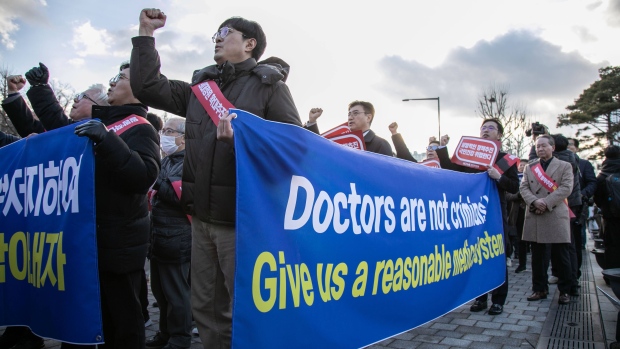Feb 26, 2024
South Korea Investigating Whether Woman’s Death Linked to Doctor Walkout
, Bloomberg News

(Bloomberg) -- South Korean President Yoon Suk Yeol told doctors to end a walkout in protest of a government plan to increase seats at medical schools, saying the labor action is threatening lives and his government won’t bow to pressure.
The South Korean government is also planning to investigate the damage caused to the health-care system by the walkout by thousands of trainee doctors, which has led to surgery cancellations and people being turned away from emergency rooms. Yoon’s administration has given doctors until Thursday to end their walkout without facing reprisals.
“The act that threatens the lives and safety of citizens while taking their health and lives hostage can’t be justified by any kind of cause,” Yoon said at a government meeting Tuesday.
About 9,000 of the country’s some 13,000 trainee doctors have walked off the job in the labor action that just entered its second week. They are protesting a government plan to increase the number of seats at medical schools by 2,000 from the current 3,058 to alleviate a doctor shortage that ranks as one of the most acute in the developed world.
The doctors contend the government’s plan does not address fundamental problems such as poor working conditions, a concentration of physicians in urban areas and not enough protection from malpractice suits.
South Korean doctors have the most in-person consultations in the developed world, according to data from the Organisation for Economic Co-operation and Development. But they also have the highest pay relative to average wages among all doctors from OECD countries, data from the group showed.
Yoon’s government has been preparing to arrest, prosecute and possibly suspend the licenses of doctors who don’t heed to the ultimatum to return to work for organizing a labor action it contends runs counter to the law.
The trainee doctors, similar to medical residents, play key roles in emergency care, and their labor action has led some hospitals to turn away people and slowed down the delivery of health care.
The public has shown support for the government plan in a country facing a demographic crisis with one of the world’s fastest-aging populations.
Vice Health Minister Park Minsoo told reporters the government plans to create an immediate response team to quickly handle situations where the health and life of people are threatened by the walkout, which has resulted in surgeries at major hospitals being reduced by about 50%. He also called on the doctors to return to work, or risk losing their medical licenses if they don’t.
Health Minister Cho Kyoo-hong earlier said an on-site investigation is being done regarding the death of a woman in her 80s from apparent cardiac arrest. Yonhap News Agency and other local media reported she was being transported by ambulance and denied entry to seven hospitals due to factors such as a lack of doctors. She finally arrived at a facility that would accept her and was pronounced dead upon arrival, Yonhap said.
Park said later the woman had terminal cancer and her case did not appear to be related to the refusal by several hospitals to admit her as a patient.
South Korea, Japan and other countries place quotas on medical school seats in a way to regulate the number of doctors. While Japan, which faces a similar demographic challenge as its neighbor, has raised its quota in recent years, Yoon’s government said South Korea has not increased the number of slots at medical schools for nearly three decades.
Critics of the walkout contend the labor action may be more about protecting the earning power of doctors rather than improving the quality of the South Korean health-care system.
Yoon has seen his support rate rise to a three-month high in a weekly tracking poll from Gallup Korea as he has not bowed to pressure to scrap or reduce his plan to increase medical school seats. This could help his conservative People Power Party in April elections, where it is trying to take control of parliament from the progressive Democratic Party.
Even a left-leaning newspaper often critical of the Yoon government, Hankyoreh, supported the increase in seats at medical schools, while taking aim at doctors. “Using the pain of their patients as leverage to protect their privileges is a bridge too far,” it said in an editorial this month.
The government has opened emergency rooms at 12 military hospitals nationwide to the public as some hospitals have been trying to steer potential patients away due to staffing shortages. It will also allow hospitals expanding the roles of physician assistant nurses to fill the void of trainee doctors and has implemented telemedicine nationwide.
--With assistance from Seyoon Kim.
(Updates and recasts with latest news from government.)
©2024 Bloomberg L.P.


